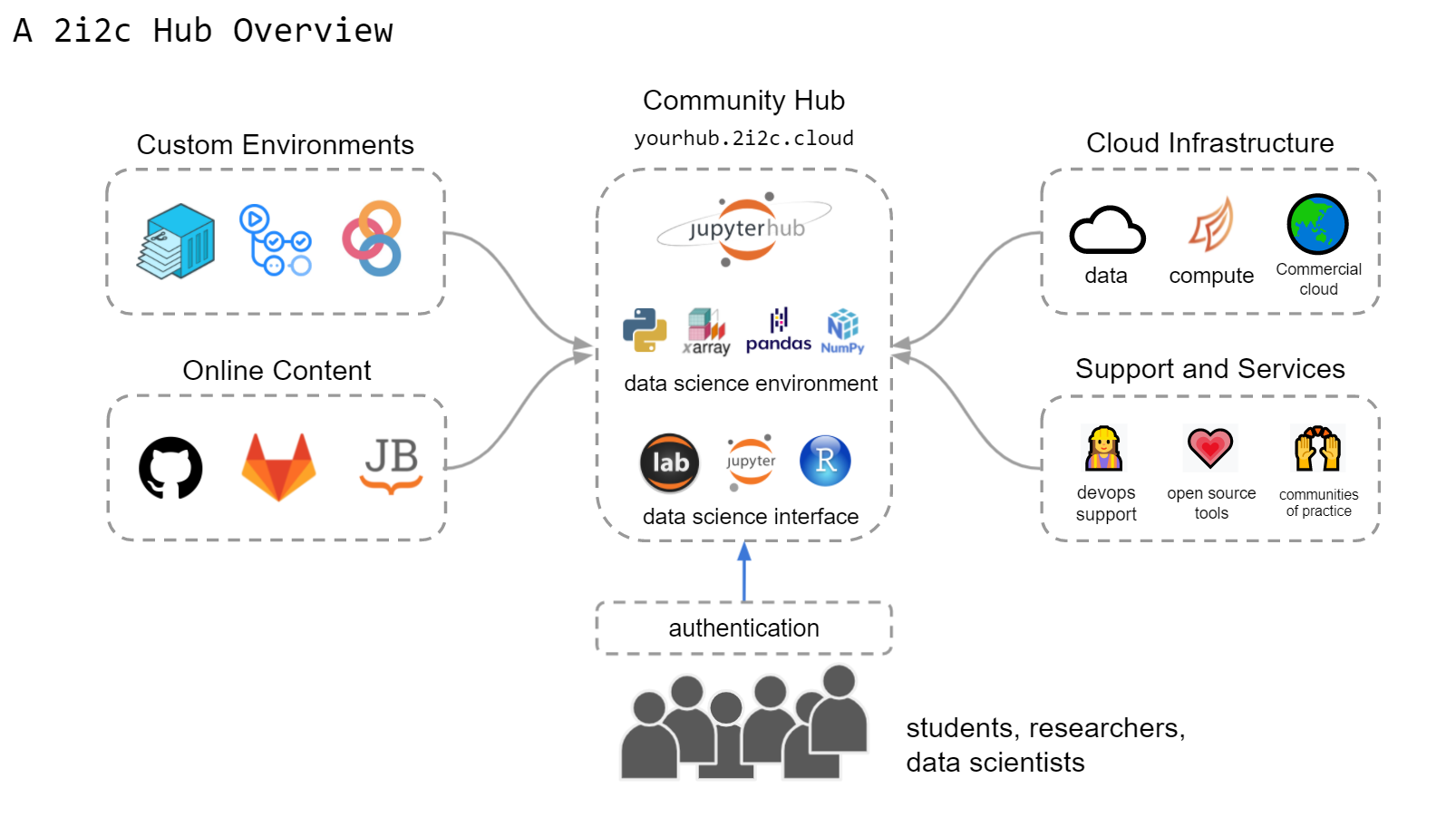JupyterHub in the cloud, managed by 2i2c

We design, develop, and operate JupyterHubs in the cloud for your community in research and education. We handle the DevOps, you focus on your work.
About the service
Our Managed JupyterHub service is a collaborative cloud service for communities in research and education. 2i2c manages the infrastructure behind the hub, and provides support for hub operations and debugging problems.
Your JupyterHub is designed to be customizable for your use-case, and runs entirely on open source infrastructure. This helps give communities the Right to Replicate their infrastructure , and makes it easier for others to collaborate with and learn from us.
- Our Shared Responsibility Model describes how we collaborate with communities in this hub service.
- Our Service Level Objectives describes our day-to-day goals running the service.
- Our Infrastructure Guide describes all of our cloud infrastructure and engineering practices, with links to our codebase.
- Our Organizational Strategy describes our overall vision and plan as an organization.
Customize your community’s environment and interface, or use one designed by 2i2c.
Provide access to select community members via a variety of authentication providers.
Choose the resources that your community needs in order to do its work.
Leverage commercial cloud features such as large-scale data storage and scalable compute.
Get development and operations support from our Open Engineering team.
No vendor lock-in, just community built open source projects. Replicate your infrastructure anytime.
Built on Jupyter and community-led infrastructure.
At the core of 2i2c’s infrastructure are tools in the Jupyter ecosystem . Jupyter is an open community that builds tools that support interactive computing workflows with data. 2i2c’s team members are core contributors in the Jupyter ecosystem, and leaders of several of its sub-projects. Jupyter’s infrastructure is flexible, and can be used in partnership with a variety of open source tools.
Configures and controls the cloud infrastructure for your user’s environments. Learn more .
UIs for exploring data and authoring interactive documents for research and learning. Learn more .
Communicate and publish computational narratives that connect with hub infrastructure. Learn more .
We build on Jupyter and tools built by open communities for a few key reasons.
- Powerful, flexible, and dynamic. Open source tools are the best for accelerating research and empowering improving education.
- Flexibility and freedom. Open source tools run on many kinds of infrastructure and help you avoid vendor lock-in. You can run the entire 2i2c stack on your own if you wish!
- Standards in data science. Open source tools are the most-common toolchain across all research fields as well as outside of academia.
- Align with your values. Open source tools are controlled and owned by a broad and diverse community that is dedicated to the public good.
- Accessible to all. Open tools are free to use and deploy, making research and education more accessible to people around the world.
Supported Cloud Providers
2i2c aims to support JupyterHubs on any cloud provider that offers a managed Kubernetes service. To start, we are focusing on the major commercial cloud providers listed below. If you would like a hub hosted on a different cloud provider, please give us your feedback . See our Organizational Strategy and Goals to learn more about our plans.
Get a hub for your community
The Managed JupyterHubs service is currently in a private alpha phase. We are running JupyterHub infrastructure for a select group of communities in order to learn more about how the service could best-support the communities we wish to serve.
- Our Shared Responsibility Model describes how we collaborate with communities in this hub service.
- Our Service Level Objectives describes our day-to-day goals running the service.
- Our Infrastructure Guide describes all of our cloud infrastructure and engineering practices, with links to our codebase.
- Our Organizational Strategy describes our overall vision and plan as an organization.
We are prioritizing running infrastructure for a diverse group of organizations for both research and educational use-cases. In particular, we wish to serve institutions with limited resources or those from under-represented institutions.
Would your community benefit from a managed JupyterHub?
Send us an email and we’d be happy to discuss your community’s needs to understand if it is a good fit for our JupyterHub service.